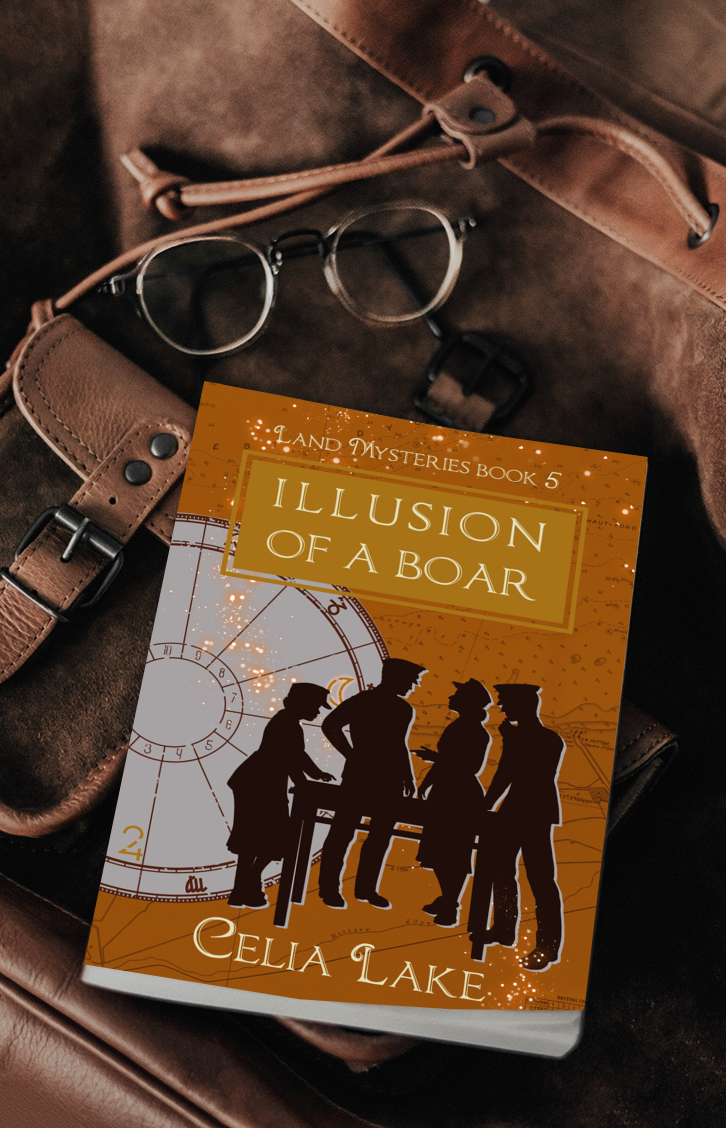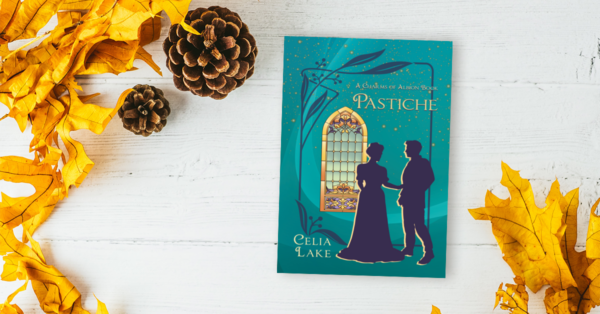Welcome to our next character study piece, this time about Orion Sisley.
Orion is the stroppiest character I’ve ever written. He has good cause – especially in Illusion of a Boar when he’s coming out a completely horrific six months or so. For those not familiar with the term, it’s slang. The term became more common in the 80s, but is dated to use starting in 1943. It means rebellious, with an edge of ‘just plain difficult’, sometimes for baffling reasons. (Here’s the Etymology Online entry.)
This post contains plot spoilers for Illusion of a Boar, Orion’s romance. (Stop at “The War” of you want to avoid those.)

Orion and his brain
A number of my characters are neurodiverse in some way, but Orion’s got an interesting story to his. When I wrote him in Eclipse, it was clear that he was frustrated by a number of things. And more importantly, that those frustrations were coming up in decidedly unhelpful ways. Over the course of the book, in the background, he starts working some of that out. Some of that’s on his own, a lot of it is listening more to Isembard and Claudio. And in due course, Thesan.
When I started writing Illusion of a Boar, I knew I wanted to do four rotating point of view characters. Orion’s first point of view chapter (chapter 3) makes it clear that while he’s coming across as short and irritated, there are some internal reasons for that.
Discoveries while writing
It was his next point of view chapter (7) that did it. I sent the chapter to Kiya when I finished writing it. Kiya came back with “He’s autistic, isn’t he?” And yes. Not only is he autistic, but he’s a particular expression of it that can sometimes be rough on other people around him. By the time we see him in 1944, he’s learned to manage a lot of that. (Well, at least when he’s not having the worst year of his life). But it’s definitely not perfect.
In his case, he understands that there are a lot of social subtleties that he’s missing. But also that Claudio can explain. (Sometimes other people, but Claudio is his preference.) He definitely has his particular special interests. It becomes clear he’s interested in history in general, but particularly so in military history, especially around the Wars of the Roses.
Orion certainly can be socially deft when he’s got a goal. Illusion of a Boar has a scene where Claudio wakes him up. Orion was out gambling with other officers in the camp. As Orion says, he won “Just the right amount, tactically speaking. Enough they’ll invite me back to see if they can win it back, not so much any one person will hold a grudge.” His actual goal, as the conversation makes clear, was to see if they’d drop any useful information while drinking and playing cards.
Still, all those skills are a lot of work for him. He’s much happier when he can retreat to better known ground and company.
The Sisleys
Orion comes from one of the longstanding landed families of Albion. When we first meet him in Eclipse, we know he has a younger brother, that his father is on the Council, and that his great-uncle Phineas is Lord.
The Sisleys – like some other families – actually have the custom of considering a sister-son as the next in line. In this case, Phineas did not have children who survived to adulthood. His sister’s son (Matthias, Orion’s father) took the family name and was formally adopted as Heir, then married twice. His first wife died when their son Hector was about 6. Matthias promptly remarried Eleanor, who raised Hector and then had two sons, Orion and Achilles.
Hector Sisley was killed during the Great War at the Battle of Vimy Ridge in 1917. Orion was about 9 and Achilles was only 2. (This means that Achilles has no conscious memory of his oldest brother.)
Matthias challenged for the Council in 1908 (the same year Orion was born) so Orion had never known anything else. Matthias was a specialist in Materia, with a particular interest in how different materials relate to each other. (And also a good touch of Sympathetic magic interest).
His school years
We first see Orion in Eclipse, when he’s in his fourth year (seventeen going on eighteen). At the beginning of the book, Isembard (who is his teacher, bodyguard, and mentor) is worried about him. He’s pushing back during his classes. Isembard and Thesan talk about him constantly walking up to a line of rudeness and abruptness and petty pranks that could turn dangerous. Orion never quite crosses it, but his teachers definitely are paying attention to it.
Two things happen over the course of the book that change that. One is Orion’s growing friendship with Claudio. When Eclipse starts, the two of them have been thrown together by circumstance since the previous year. While they’re a year apart in school, both of them are sons of Council members. And they’re both getting additional private training from Isembard.
The other key thread of the book is Isembard working through how to get Orion to look at things a bit differently. Some of that’s with Thesan’s help. Over the course of Eclipse, Thesan and Isembard are working out what their relationship might be (beyond ‘friends and fellow teachers’). It becomes clear that Orion has been paying attention and taking Thesan more seriously. She, in turn, understands about the world being too fast or too spiky or too poorly explained. Some of her suggestions are reassuring to Orion. (As is the way she takes him seriously when he engages with her in a different way.)
Here’s a snippet from an extra that’s not shared yet. It’s while Orion and Claudio sorting out being friends (rather than just thrown in together).
“And maybe sometimes other things?” Claudio offered. “What’s it like talking to Professor Wain?”
“Quiet. Not spiky.” Orion grimaced. “I don’t know how to explain, it sounds stupid. But she did set up to work through that test with me, I told you that. She’s really careful, laying things out. Professor Iz or Professor Landry, they’d skim through the set-up? But she made it clear she thinks the set-up is as important as the work. And taking notes at each step. Really fiddly? Only she got to talking about how that’s a lot of astronomy. Sometimes you only get one chance to do a measurement of something – a comet, an eclipse, something like that. So you want to make it so everything goes smoothly when you do. You can do it fast, when you know what you’re doing, but she’d never done what we were doing before, so we did it slow.”
The impact of Magician’s Hoard
The next school year – 1925-1926 – brings new challenges. Toward the end of the year, it becomes clear that Orion’s great-uncle has been caught up with some extremely nefarious dealings. The actual details don’t come out in that book (which ends before the various legal proceedings happen). However, Phineas Sisley resigns the title in favour of his nephew (Matthias). He is under more or less house arrest on one of the smaller family estates.
That changes Orion’s expectations, just as he’s leaving school and going into a planned apprenticeship. His father is now Lord, he becomes his father’s Heir, with all the greater social visibilty that brings.
Adulthood
Orion doesn’t ever entirely explain his apprenticeship. But it’s clear through Illusion of a Boar that he’s highly trained in various of the martial and protective magics (and a fair number of other related skills). He’s had a fair number of sexual partners. Though he talks in that book about how Isembard sat down and explained how to do that well and fairly to the women involved.
In 1936, he marries Decima Chambers. She’s a woman of good family (also of Fox House at Schola), about four years younger than Orion is. At first the marriage is agreeable enough to both of them. They have Melchior, their son and first child, in October of 1937.
But in 1939, the war starts, and Orion quickly sets off to use all those martial and protective skills. He comes home for a leave in 1940, which results in their second child, Sybil, born in March 1941. Later on, Orion wonders exactly how much Decima had planned that.
The war
It’s not entirely clear all of Orion’s postings during the war. He mentions ending up in the same hedge with Alexander Landry at one point in Illusion of a Boar, but not what the two of them were doing.
By 1943, he’s serving in the Dodecanese Islands off Greece, in a gruelling campaign. It’s there that his left hand is badly injured. This involving the loss of two and a half fingers (his pinky, ring finger, and half his middle finger). There’s scarring that goes up onto his wrist and arm, and all the emotional complication that goes with that. Especially for someone who is a magical duellist, used to running his magic through ten fingers and two hands. (He does eventually learn to rebalance this, but it’s not an instant process.)
He is invalided back to the UK and to the magical hospitals in Albion. By the time he arrives, there’s not much they can do other than some work to reduce some of the limitations of the scarring. The goal is to give him as much mobility in his hand as is possible. The non-magical army wouldn’t take him back at this point, so he’s sent off home for ongoing recovery.
Where he walks into his rooms to find his wife with a lover. It becomes very clear that first, she intended him to walk in, and second, she wanted to hurt him in the process.
Forward into a new project
Orion is – and remains – baffled by the whole thing. It’s not something he ever thought he had to worry about. It’s not the having a lover that’s a problem. (Like many families of that class in Albion, the marriage agreements are about lineage and familial commitments. Lovers outside of that are generally fine with appropriate precautions.) And certainly, the way Decima treats Orion (and then their children) is not remotely acceptable.
By the time Illusion of a Boar begins, he’s worked through all the necessary legal and magical untangling of the marriage. (He’s just waiting for the final decree as the book opens). And that doesn’t actually make anything better. He’s heart-hurt, confused, betrayed, and entirely tangled up when he arrives at Camp 020 for a new assignment.
The first good thing is that Claudio is there. Claudio has, in fact, arranged for Orion to be assigned to this. That’s both because it is somewhere Orion’s skills and experience are relevant, and because Orion needs to be doing something meaningful. (And Claudio misses having him nearby, too.) Interactions with the two women assigned to the project – Hypatia and Cammie – are rather more rocky.
Making things work
Orion keeps asking questions, but in the sort of way that Hypatia reads as someone questioning her expertise. When Orion finally gets a chance to talk to Isembard and Thesan, we get one of my favourite scenes ever. In it, Thesan and Isembard walk Orion though the fact they’ve spotted several places he’s having trouble. And then she explains the way Hypatia is likely taking his questions – due to a combination of her own experiences related to gender, race, and magical specialty. She suggests something Orion can try instead, and he agrees to give it a go.
That works a great deal better. The more Orion pays attention to Hypatia and her reactions, the more intrigued he is. By the time he blurts out that she’s beautiful, he’s intrigued by her skills, knowledge, and how she handles herself. That turns out well for both of them, actually. What Hypatia’s needed has been someone who appreciates her and gives her space to be her nerdy and sometimes perfectionist self.
In the immediate aftermath of the war, they’re continuing to work closely together (along with Gabe).
After the war
In one of the extras in As The Ground Shifts, Gabe and Claudio begin to work out a theory of the tendencies of the Council seats. Of course, they want to test that theory. One excellent way is to get Orion to make a challenge when Garin Fortier retires. Orion agrees, though he’s not at all sure it’s a good idea. That turns out well for him (you can see it from Lizzie Carillon’s perspective at the end of The Three Graces).
I’ve got some extras in progress around their wedding, including a much requested scene of Hypatia’s mother meeting Alexander Landry. And we’ll definitely have more of Orion (and Hypatia and Cammie) in Claudio’s romance when we get there in 1950. It’ll be out in May 2026 if all goes well.




